Helping hands: Teen father benefits from Chaparral’s array of social services
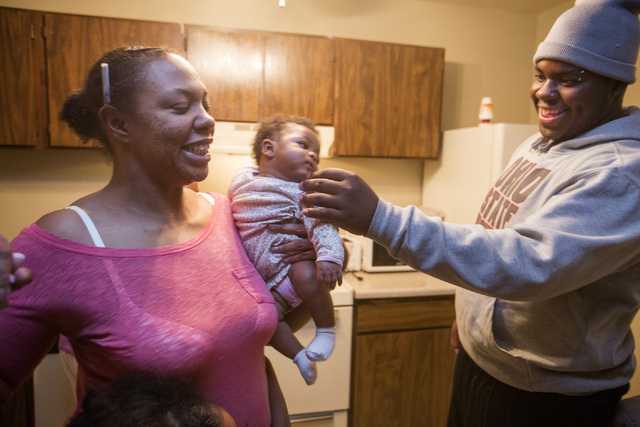

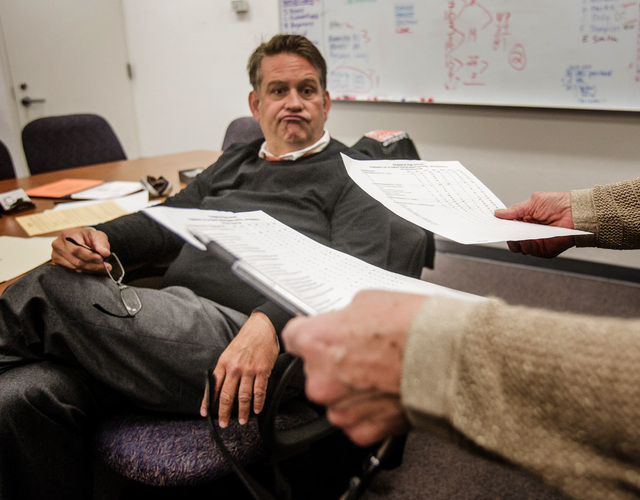
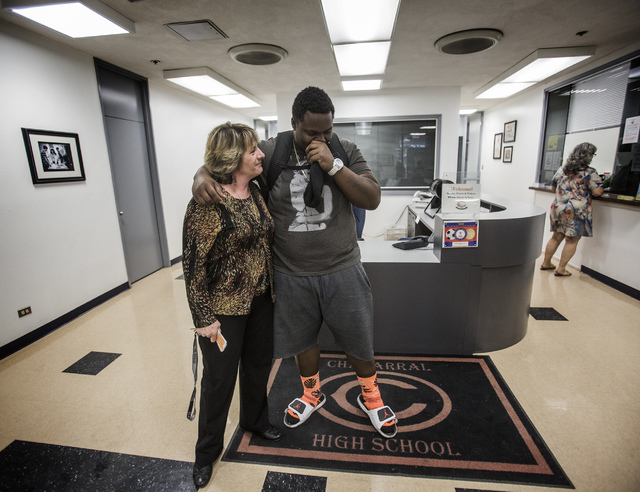
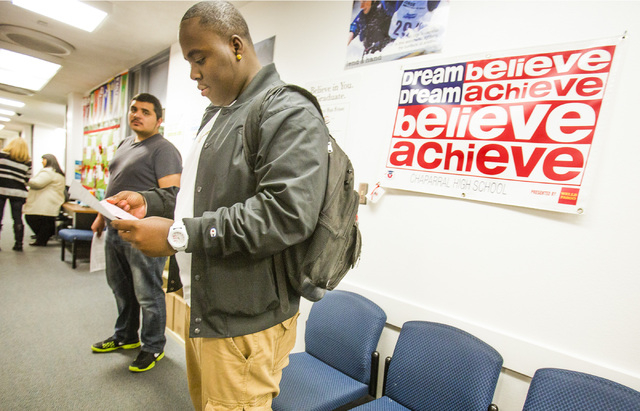
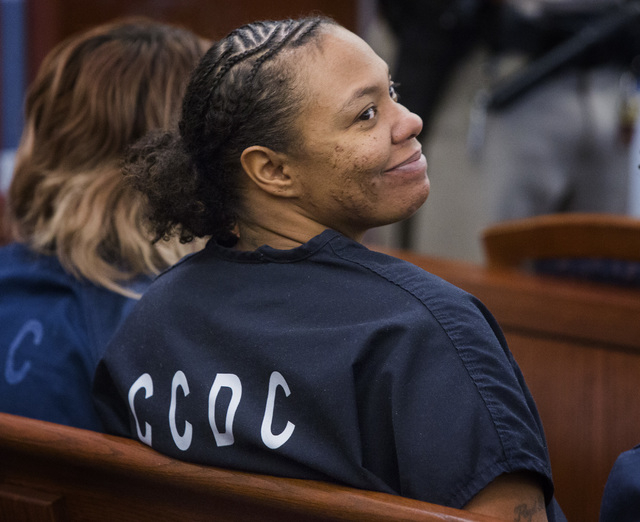
Principal David Wilson paces past lockers and down empty halls, searching.
He knocks on the second-floor door of Chaparral High School’s social worker. Three days a week, she provides parenting classes, baby formula and diapers to student parents.
No luck.
“That’s where Bubba goes first” and gathers supplies, says Wilson, walking down the hall, continuing his search for the teen father.
At any given time, the school has 50 or more student parents and 20 pregnant girls, says Wilson, well aware Nevada’s teenage pregnancy rate is seventh-highest in the nation, and even higher on his campus. The school nurse sees so many miscarriages, she has become an expert on recognizing symptoms. “What you think would be an abnormality, for us it’s kind of the norm.”
Right now though, Wilson’s mind is on senior James “Bubba” Dukes. It’s March 19, and Dukes has been absent for more than a week. But he returned early that morning after front office worker Loretta Tucker called him. She had a bad feeling.
“Are you doing something you’re not supposed to be doing?” Tucker asked Dukes over the phone.
“Yes.”
He didn’t elaborate.
“Bubba, you need to come to school. You have a child. We’ve talked about this,” said Tucker, Chaparral’s attendance specialist, who tracks habitual truants. Students call her “Ma Tucker” because of her caring, blunt nature.
Wilson heads toward a makeshift office where local nonprofit Communities in Schools has three workers in-house at no cost to Chaparral. They provide aid to 200 struggling students like Dukes, an obvious dropout risk.
He is passing many of his courses and catching up on credits while raising a baby but has stopped coming to school. The oldest boy among 10 children, eight of whom are being raised by a grandmother scrounging to keep them fed and sheltered, Dukes asserts he will do anything to graduate, earn a football scholarship and improve his family’s fortunes.
“I hardly see Bubba anymore,” Wilson hears from Communities in Schools site coordinator Velvette Williams, who is also the school’s homeless advocate.
She identified 135 homeless students in 2013-14, which included Dukes for a time. At 6 percent, Chaparral’s homeless student rate is twice the Clark County School District average. The district serves a metropolitan area ranked second in the nation for its rate of homeless youth without parents, according to the U.S. Department of Housing and Urban Development’s 2013 report to Congress.
Williams has tutored Dukes, mentored him and encouraged him. Many hands have offered help Dukes, who faces crisis after crisis as he reaches for a diploma. The school provides free diapers, baby formula, food, clothes and supplies for his large family through its many wraparound services, an array unrivaled by the district’s 48 other high schools, according to Susan Sernoe, district director of wraparound services. Many Clark County schools have similar needs, but Chaparral’s mission to improve and its persuasive principal have won the support of several nonprofits.
Tucker even took food and supplies to Dukes’ family when they were evicted at the beginning of the school year. “Such a well-mannered young man. He just stole my heart,” Tucker says. But she’s struggling to get through to him, and so are others.
“I think he feels like his life is cut out for one certain thing, and that’s what he’s going to do,” adds Jennifer Lopardo, Communities in Schools lead site coordinator at Chaparral.
Wilson walks off, pausing to pull a folded paper from his pocket. His finger traces down Dukes’ class schedule.
“Algebra,” he says, walking off.
No luck, again.
“He needs that class to graduate,” says Wilson, striding down a second-floor hall, bending to pick up a paper airplane on the concrete floor above Chaparral’s quiet courtyard.
‘YOU WANT TO SAVE A KID’
Shortly after Tucker’s phone conversation with Dukes on March 18, Dukes texts her.
“I don’t like being out in the street all day trying to make money,” he wrote without disclosing what he was doing. “I really want to graduate, Mrs. Tucker. I’m really sorry I missed all those days. I’m just doing what I have to so me and my family can survive. I’m done with all this street crap. I want to be somebody my daughter can look up to. I don’t want her to see me in prison.”
Dukes arrives early on March 19 to meet with Tucker. He tells her he has been selling drugs with a few others, all young fathers. About 13 percent of Nevada teens are not in school or legally employed, the highest rate of any state and far above the national rate of 8 percent, according to the U.S. Census Bureau.
With less than three months to graduation, Dukes lacks 10.5 credits of the 22.5 credits required to earn a diploma. But that’s not the only thing on his mind. Dukes tells Tucker that police found his next-door neighbor dead, stabbed 30 times.
The homicide sends Dukes’ family to a hotel for two days. When they return to the apartment to pack and move, they find it ransacked. Not a pot, plate, pair of pants, diaper or the baby’s crib was left.
“What this kid has been through, what he’s shared with me, no kid should have to go through,” says Tucker, referring to obstacles constantly coming between Dukes and his diploma. And Tucker is not the only Chaparral staffer trying to keep him on track.
“Almost all of us have been to Bubba’s house one time or another,” Wilson says.
Dukes skipped his classes after leaving Tucker’s office.
“If I were to put two and two together, he’s on the corner. But if I pull up, do I put him in danger with the people he’s with? That’s a fine line. You want to save a kid. …” Wilson stops midsentence.
He met Dukes on the first morning of school in 2011 as he stood out front looking for something else. Wilson had heard Chaparral students would walk off buses and into neighborhoods, prompting Las Vegas police to post full-time units in the area. They arrested students for vandalism, graffiti and breaking and entering.
He spotted the sophomore Dukes — his hands already the size of pot roasts — walking off a bus. Wilson asked his year in school. Dukes told him he was supposed to be a sophomore but had zero credits.
Wilson asked if he played football.
“No, sir,” he replied, looking Wilson in the eyes.
“Why not?” Wilson was immediately taken with the student who was “kind, gentle, made good eye contact. Polite.”
“Mister, I missed probably 100 days of school last year. I’m ineligible,” explained Dukes to the new principal, whose takeover of Chaparral stirred student protest. Wilson replaced about 75 percent of the school’s 200-member staff and received a $2.5 million grant from the federal government to turn around Nevada’s worst-performing high school, which had a 34 percent graduation rate in 2011.
All those years ago, Wilson also introduced Dukes to new football coach and weightlifting instructor Bill Froman. Wilson recalls that as he throws away the paper airplane. He takes out his cellphone and calls the coach.
“Bubba is in the weight room,” Wilson says as he pockets his phone and marches off.
THE DAD HE WANTS TO BE
Surrounded by fitness machines, Wilson makes small talk with Dukes, says he has been missed and asks how he has been. Dukes remains silent, eyes to the floor.
“Not too good, Mr. Wilson,” Dukes finally replies.
More silence.
“What kind of choices you been making, boss?” Wilson asks.
“Not the good ones, Mr. Wilson.”
“The thing is, we love you,” the principal says. “I don’t know any place in the world that has shown as much love to you as we have, my friend. We continue to. But, in the end, whose decision is it?”
“Mine, sir,” Dukes replies without pause.
Wilson then asks how the baby’s doing.
“Healthy. Chunky,” Dukes says with a chuckle.
“Here’s my problem, you understand. I’m sitting here trying to figure out how to best help you. I don’t know how to help you,” says Wilson, mentioning a friend in the Las Vegas police’s gang unit he may have to call. “I know that if I become involved, it doesn’t get pretty. You know that?”
“Yes, sir,” Dukes replies.
He repeats a vow he made to himself in April 2013, halfway through his girlfriend’s pregnancy. Seeing his absentee father prompted the vow.
“The one thing I don’t want to be is the dad to my daughter how you was to me and my sister,” Dukes told his father, the parent he has seen only once since seventh grade.
On that April day, facing fatherhood himself, Dukes changed his mind about never wanting to see his own father again. He took a bus to his father’s tire shop. The two sat with customers waiting for their cars. Dukes’ father begged for forgiveness.
“I love you because you’re my dad, but I don’t want to be bothered with you,” Dukes told his father, who cried. “Cause you weren’t there then, you don’t need to be here now. I want to be a good dad, and I want to be there cause you wasn’t there. I want to be there for mine.”
Dukes shook his father’s hand, hugged him and said, “I love you and I forgive you.”
‘QUICK MONEY’
“How do I help you?” Wilson asks as he stands over Dukes in Chaparral’s weight room in mid-March.
“You don’t owe me anything, Mr. Wilson,” Dukes responds.
Wilson lets that pass and tells Dukes to see the school social worker for baby supplies.
“We’ll take care of you like we always do,” Wilson says. “We want you here. I need you to have a life so you can take care of your baby and your family and future kids.”
Coach Froman tells Dukes to grab some lunch and head to class. Wilson walks Dukes out the door, asking him about his new tattoos inked by a classmate. Streaming down his forearms are the Stratosphere, poker chips, playing cards and the “Welcome to Las Vegas” sign. Also the message, “Loyalty is everything.”
“For every one of us pulling him this way, there are three others, anchors, dragging him the other way,” Froman says after Dukes leaves.
Dukes just tends to find the wrong people, Froman says.
“I’ve been trying to get a job everywhere,” Dukes says in March. “Del Taco. McDonald’s. Albertsons. Taco Bell. Gold’s Gym. Even a hair salon to clean up. Not an interview.”
Some former Chaparral students offer to let him sell drugs with them. They give him a corner. Dukes has $2.50 in his pocket after taking the bus there in early March.
“I was broke,” Dukes says. “When I went home, I had $120. That was quick money. Once that happened, I kept doing it.”
His grandmother and his girlfriend, Dajee Hill, tear up when they hear he is selling drugs. Hill’s father has been in prison since she was 13. She remembers the Father’s Day he was arrested. Hill and her sisters were about to start a swimming race with their father. Instead of hearing “Go,” Hill heard police say, “Willie, put your hands up.”
“My dad looked at me and said, ‘It’s time for me to go,’ ” Hill remembers.
Shortly after Dukes starts selling drugs, he stops because of the reactions of Tucker, his grandmother and his girlfriend. He calls the other dealers to quit. They hang up on him.
Before Wilson leaves Dukes in the weight room, he hands him $5 for lunch, hugs him and walks upstairs to his office. Wilson pauses to look over the courtyard.
Students roam. Some chat as they eat at round tables or lean against columns. Couples stand close together, whispering.
“I like this view. It’s like Skittles. You don’t see kids grouped by anything. Just good kids,” Wilson says.
He gets a fist bump from a passing student. Wilson asks if he pulled up his algebra grade. The student says yes as he walks off.
Alone again, Wilson admits it. “I lose more than I save.”
There is still hope for Dukes, who can graduate if he takes the help that Chaparral offers him.
“I have to start going to school for real,” Dukes says, grabbing a burrito and heading to class.
WHAT SHAPES THE NUMBERS
The plight faced by Dukes and the struggles of other students who shape Chaparral aren’t just a professional matter to Wilson. He deals in statistics, but he knows what drives the numbers.
“Just about every child at this school is challenged in some way,” says Wilson, who has faced his own dragons. His life changed with a phone call during Chaparral’s football season opener in Pahrump. His sister, battling drug addiction, had died under questionable circumstances.
“She had three beautiful children,” Wilson says. “You walked into the home, and the kids hadn’t had anything to eat for weeks, literally.”
He comes from a family of educators. Wilson’s father was a professor of education administration at Kansas State University. His mother was a first-grade teacher. His brother is a principal. His wife is a teacher. Over the years, they tried every legal avenue to obtain custody of his sister’s children. They were unsuccessful “until my nephew found her dead last August.”
“When I see these kids, they’re my sister’s kids,” Wilson says of his Chaparral students.
Wilson feels that as he looks at Dukes, who also comes from an educated family. His great-grandfather was a lawyer. His great-grandmother was a schoolteacher. His great uncle was a dentist, all of them attending Howard University in Washington, D.C., says Dukes’ grandmother, Margaret Cole. She graduated from Kent State University and became a social worker.
Among Cole’s four children, her oldest son is an engineer, the other is an attorney. Her oldest daughter is a physician’s assistant who married a commercial pilot.
But her youngest child, Oyetta Trotter, Dukes’ mother, “had a tough time” after Cole moved to Las Vegas in 1984 to take a job as a social worker. Trotter, the only child then living with Cole, enrolled at Bishop Gorman High School. Or so Cole thought.
Without her mother’s knowledge, Trotter withdrew from Bishop Gorman and enrolled at Bonanza High School to be with Dukes’ father.
“Oyetta has no reason for doing the things she does,” Cole says. “Oyetta didn’t have the hard life these kids are having. She just wasn’t motivated.”
Her grandson is a lot like his mother, Cole says. Dukes showed up a week late for summer school after his junior year and couldn’t attend. He dropped out of night school his senior year. “He’s lazy.”
But she has faith that Dukes will find his way. She supports her daughter’s family on retirement pay earned during her long career in social work.
“I think about all the people I helped,” the 73-year-old grandmother says. “I’m sitting on the other side of the table now.”
Cole’s oldest daughter recently bought her a condominium outside of Cleveland and a sport-utility vehicle, begging her to move back to Ohio. Cole plans to do so, taking Trotter’s six youngest children with her to “put them on the right track.” Cole now has full custody of them.
But Cole keeps pushing back the move date, waiting for Dukes to finish high school and for Trotter to rebound.
TOUGH DECISIONS
Wilson often wonders what will become of Dukes and Chaparral. Both student and school are fighting to survive, and Chaparral, along with Western and Mojave high schools, faces the expiration of special federal assistance at the end of 2013-14.
Strides have been made. Under Wilson’s tenure, Chaparral pushed its graduation rate past 50 percent in 2012 — up from 34 percent in 2011 — the largest percentage point increase among Clark County’s high schools for that year.
In 2013, Chaparral’s graduation rate climbed to 62 percent. The college-bound rate for Chaparral students went from 4 percent for the class of 2011 to 30 percent for the class of 2013, Wilson says.
But statistics don’t say it all. Chaparral may be rebounding, but maintaining that is a “constant challenge.” He sees that in Dukes, who is constantly playing academic catch-up. Nearly half of Wilson’s students leave midway through the school year, a fifth of them doing so with whereabouts unknown. New enrollments happen every day, even in the last week of school.
Knowing the uphill battle he faced when he took over Chaparral, Wilson held one qualification paramount as he interviewed staff, retaining only 50 of Chaparral’s 200 teachers and other staff. They had to “truly care about children. You can teach people how to teach mathematics, but I can’t teach people to care about kids.”
But as Wilson scans the faces of his students, he is keenly aware that caring about them doesn’t equate to saving them. He doesn’t want to lose Dukes. He knows he might.
English teacher Bonnie Moses and others teachers allow Dukes to make up work, understanding the stress he is under.
“These are kids,” Moses says. “I don’t care how big they are. They’re kids.”
Dukes had a C in English before he quit coming to school midyear. He can still graduate if he sticks to his classes, finishes online courses and passes the state-required proficiency exams.
Standing at Chaparral’s second-floor railing as students pass below, Wilson talks about tough decisions. The ones his students make, forcing him to make his own. He mentions a 19-year-old student who recently caused a fight. The student had been living under the U.S. Highway 95 overpass behind Chaparral. Fighting would usually lead to a suspension or expulsion. But, “if I put him out, I sign a warrant.”
Wilson soon will face a similar dilemma with Dukes.
Contact Trevon Milliard at tmilliard@reviewjournal.com or 702-383-0279. Find him on Twitter: @TrevonMilliard.

BUBBA’S STORY
As a Chaparral High School junior, James “Bubba” Dukes was a promising football player buffeted by personal crises as he fought to fulfill his potential.
The story of the student and the school is chronicled in a three-part Las Vegas Review-Journal series.
Part 1: As a senior, his battle to graduate intensifies, mirroring Chaparral’s own struggle to help students like Dukes succeed.
Part 2: Many hands offer help to the Chaparral High School senior, a teen father reaching for a diploma that’s his key to a football scholarship and his stepping stone out of poverty.
Part 3: Graduating, always a long shot for Dukes, becomes even more unlikely. With less than three months to graduation, the football player hoping for an athletic scholarship is still short a year’s worth of credits.
Also, see this photo feature with images taken in 2012:













